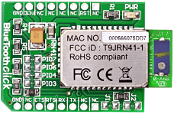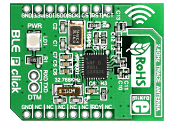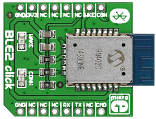 |

|
|
The BlueTooth Click board is an accessory board in the mikroBus form factor. It offers low power, highly economic Bluetooth radio for adding wireless capability to your products. The on-board RN-41 module with serial UART interface is simple and easy to use, with up to 100m range. The board is designed to use a 3.3V power supply only. |
|
|
|
 |

|
|
Bluetooth2 Click features the BLUEGIGA WT41 Bluetooth 2.1 module with an operating range of 1000m (between two WT41 modules). It is equipped with iWRAP firmware which enables users to access Bluetooth functionality with simple ASCII commands delivered to the module. It supports up to 14 Bluetooth profiles. The board is ideal for developers who want to integrate the Bluetooth wireless protocol with a limited knowledge of Bluetooth and RF technologies. It uses four UART interface lines and is designed to use a 3.3V power supply only. |
|
|
|
 |

|
|
BLE P click carries an nRF8001 IC for adding a Bluetooth 4.0 (alternatively known as Bluetooth Low Energy) peripheral device to your design. BLE is an essential feature of today's "smart" gadgets. Its low energy consumption makes it ideal for sport and fitness devices, proximity sensors, smart watches and so forth. Newer smartphones, tablets and computers have hardware and software support for BLE. To get you started with BLE P click, an open-source BLE Android app is available (works on devices with hardware and software support for BLE). BLE P click communicates with the target board MCU through mikroBUS SPI (CS, SCK, MISO, MOSI), RDY and ACT lines. It uses a 3.3 V power supply only. |
|
|
|
 |

|
|
BLE2 click is a simple solution for adding Bluetooth 4.1 (also known as Bluetooth Low Energy, BLE, Bluetooth Smart) to your design. It features the RN4020 module from MicroChip that has the complete Bluetooth stack and can act both as a client or a server. Additionally, the RN4020 module supports 13 public profiles and 17 public services, including the MicroChip Low-energy Data Profile (MLDP). BLE 2 communicates with the target board microcontroller through mikroBUS RX, TX and AN (CMD), PWM (CONN), and RST (WAKE) lines. The board is designed to use a 3.3V power supply only. |
|
|
|
 |
|

